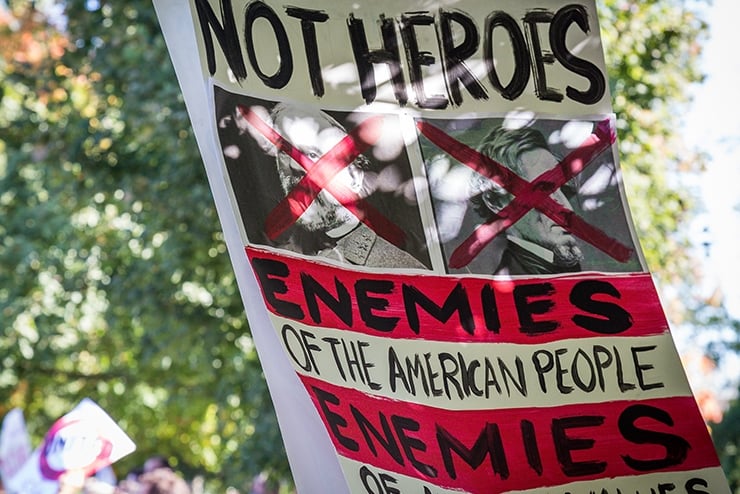I was recently gifted The South Was Right, by James Ronald and Walter Donald Kennedy, an updated version of a work originally produced in 1994. Seeking an antidote to the PC historiography in which our universities are now awash, I happily plunged into this printed gift.
The present “leftist ideologues,” more than their predecessors, hate the white South and have worked tirelessly to discredit it, facing no significant opposition. As a result, “everything associated with the traditional, conservative Bible-believing South has been demonized.” This is especially true since “older forms of Marxism,” the Kennedy brothers write, have been replaced by “Neo-Marxists composed of liberals, progressives, socialists and other social justice warriors.” Such complaints echo my own arguments about the rampaging “post-Marxist Left” that is taking over our country.
Although the first part of The South Was Right includes obligatory, predictable attacks on “Yankeedom,” the Kennedy brothers’ discussions of antebellum slavery, the Civil War, and Reconstruction are certainly worth looking at. Their treatment of these topics brings up historical interpretations and researchers that were still taken quite seriously when I was in college in the early 1960s. These include opinions on Reconstruction, segregation, and the Civil War as a “repressible Conflict,” from respected historians such as J.A. Dunning, C. Vann Woodward, and Avery Craven.
The interpretations of such historians are often ignored because they fail to advance the Left’s anti-white agenda, much of which centers on perpetually dumping on Southern whites as racists with a uniform history of racial oppression. Yet in the not-so-distant past even Marxist historians could write about the antebellum South without falling into hate-filled spasms. S. L. Engerman and Eugene Genovese, whom the Kennedy brothers mention in discussing the antebellum South’s slave economy, were both Marxists when they produced their seminal works. Holding such views of the South—regardless of left or right ideology—seems to no longer be an option for young scholars, unless they are resigned to having less-than-desirable publishing houses accept their material.
The Kennedys produce copious evidence that many Americans, including constitutional jurists, believed prior to 1861 that states had the rights to nullify and secede. This belief persisted among Northerners as well as Southerners, as New England states discussed secession in January 1815, at the Hartford Convention, because of their outrage over the War of 1812. What held them back was not a sudden discovery that they misunderstood the Constitution. They assumed they had a right to leave but did not exercise that right because the war they opposed ended as they were meeting.
One of the most compelling witnesses to the fact that the South viewed itself as a distinct nation came from the English novelist Anthony Trollope. Traveling in the U.S. at the time of the Civil War, Trollope was an English Liberal, not a Tory like Benjamin Disraeli, who took the South’s side out of affection for its gentry class. Trollope believed the South “had become a separate people dissevered from the North by habits, morals, institutions, pursuits, and every conceivable difference in their modes of thought and action.” According to Trollope, North and South “still spoke the same language, as do Austria and Prussia; but beyond the tie of language they had no bond but that of a meager political union in their Congress at Washington.”
Trollope’s words show that by 1860, what separated North and South was much more than the fact that a minority of Southerners owned slaves (as did some Northerners in border states). Southerners were fighting as an invaded nation in a fateful struggle they would disastrously lose. And as the Kennedy brothers remind us in The South Was Right, the Old South’s defeat and subsequent occupation would permanently change the structure of the American government.
That the issue of states’ rights was prominent in the early 19th century is also seen in a widely studied text on the Constitution written by William Rawles. This text was used at West Point in the 1820s, and explicitly conceded the right of states to decide whether they would “continue to be members of the Union.”
Such details are worth noting not because we can undo what happened in 1865, but because it seems foolish to argue that the South was engaged in “treason” when it seceded. In my mind, a far greater sin than the South’s effort to leave the Union was what was done in response. The successful campaign to force Southern states back into the Union cost over 750,000 lives and left large sections of the country devastated. This devastation remains for me the most horrendous chunk of American history.
For those who dwell on the slavery question to justify this carnage, it is highly likely that slavery would have ended by the 20th century due to socio-economic reasons or the danger or reality of revolts. If Northern states objected in the 1850s to a law forcing them to return escaped slaves, they would not have had to do so if the Confederacy had become an independent political entity.
Image Credit:
Image Credit: Wikimedia Commons-Mobilus In Mobili, CC BY-SA 4.0

Leave a Reply